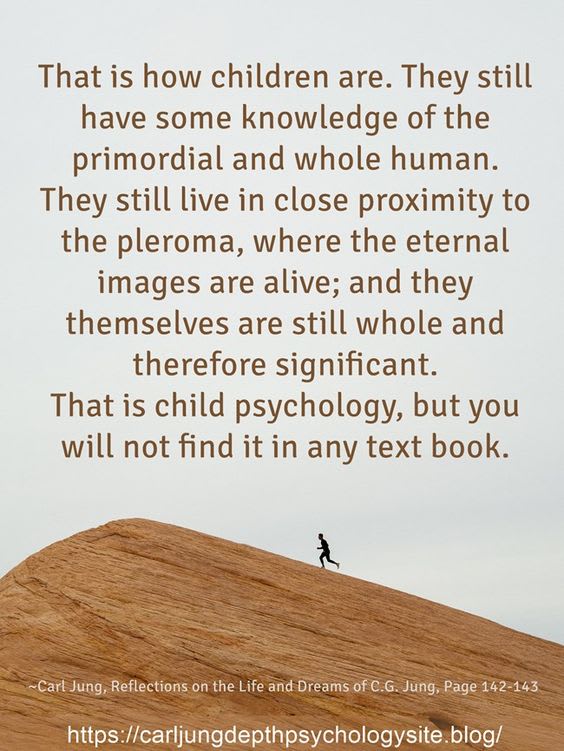
Kids Going to Space
宇宙意識を持つ小学生、自分の中の自分と見たい夢を決めているよ
【胎内記憶】お母さんを選んでうまれてきた子供たちに池川明がインタビュー!【前編】空の上での生活やお腹の中への入り方はそれぞれ違う?

子どもたちはそういうものです。 彼らはまだ原始的な人間全体についての知識を持っています。
彼らは今でもプレローマのすぐ近くに住んでおり、そこでは永遠のイメージが生きています。 そしてそれら自体はまだ完全であり、したがって重要です。
それは児童心理学ですが、どの教科書にも載っていません。 ~カール・ユング、C.G.の人生と夢についての考察 ユング、142-143ページ
カール・ユングがプレローマについて語る。
That is how children are. They still have some knowledge of the primordial and whole human.
They still live in close proximity to the pleroma, where the eternal images are alive; and they themselves are still whole and therefore significant.
That is child psychology, but you will not find it in any text book. ~Carl Jung, Reflections on the Life and Dreams of C.G. Jung, Page 142-143
彼らは今でもプレローマのすぐ近くに住んでおり、そこでは永遠のイメージが生きています。 そしてそれら自体はまだ完全であり、したがって重要です。
それは児童心理学ですが、どの教科書にも載っていません。 ~カール・ユング、C.G.の人生と夢についての考察 ユング、142-143ページ
カール・ユングがプレローマについて語る。
That is how children are. They still have some knowledge of the primordial and whole human.
They still live in close proximity to the pleroma, where the eternal images are alive; and they themselves are still whole and therefore significant.
That is child psychology, but you will not find it in any text book. ~Carl Jung, Reflections on the Life and Dreams of C.G. Jung, Page 142-143

"There are many levels of Life which we cannot see and know, yet which certainly exist. There is a larger world, vast enough to include immortality...Our spiritual natures belong to this larger world...If death is apparently an outward fact, immortality is an inner certainty." MANLY P. HALL
「生命には、私たちが見ることも知ることもできない多くのレベルがありますが、確かに存在します。不死を含むほど広大な、より大きな世界があります...私たちの精神的な性質はこのより大きな世界に属しています...死が明らかに外側のものであるならば、 実際、不死性は内なる確信なのです。」 マンリー P. ホール
「私は驚き、失望し、自分自身に満足しています。私は悩み、落ち込んでおり、有頂天になっています。これらすべてを同時に行うので、合計することはできません。私には究極の価値か無価値かを判断する能力がありません。私は自分自身と自分の人生について何の判断もありません。私が確信していることは何もありません。私には明確な信念はありません。実際のところ、何についてもそうではありません。私は自分が生まれて存在していることだけを知っており、連れて行かれてきたように思えます。私は基盤か、私の知らない何かの上に存在します。」
― CGユング
“I am astonished, disappointed, pleased with myself. I am distressed, depressed, rapturous. I am all these things at once, and cannot add up the sum. I am incapable of determining ultimate worth or worthlessness; I have no judgment about myself and my life. There is nothing I am quite sure about. I have no definite convictions - not about anything, really. I know only that I was born and exist, and it seems to me that I have been carried along. I exist on the foundation or something I do not know.”
― C. G. Jung
まさに、百の魂を通って私は自分の道を進み、
百のゆりかごと誕生の苦しみ。 私は何度も別れを経験しました。 私
悲痛な最後の数時間を知っています。 【ニーチェのツァラトゥストラ】
百のゆりかごと誕生の苦しみ。 私は何度も別れを経験しました。 私
悲痛な最後の数時間を知っています。 【ニーチェのツァラトゥストラ】
― CGユング
Verily, through a hundred souls went I my way, and through a
hundred cradles and birth-throes. Many a farewell have I taken; I
know the heart-breaking last hours. [Nietzsche’s Zarathustra]
― C. G. Jung
hundred cradles and birth-throes. Many a farewell have I taken; I
know the heart-breaking last hours. [Nietzsche’s Zarathustra]
― C. G. Jung

あなたは変わりました。You've changed.
そうするはずです。 We're supposed to.
マリア・スクリバン
そうするはずです。 We're supposed to.
マリア・スクリバン
Carl Jung on the Pleroma.
「人間の意識を反映していない創造物には識別可能な意味がないので、潜在的な意味の仮説は人間に宇宙論的な重要性、つまり真の存在意義を与えることになる。一方、潜在的な意味が創造主の一部であると考えられる場合には、 創造の意識的な計画について、次のような疑問が生じます:創造主は、自分自身を何に反映できるかをすでに知っているのに、なぜこの現象世界全体を舞台管理する必要があるのか、また、すでに自分自身を意識しているのに、そもそもなぜ自分自身を反映する必要があるのでしょうか? 反射する像がどのようなものになるかを事前に知っているのに、自分の全知と並んで第二の劣った意識――何百万もの陰気な小さな鏡――を創造すべきだろうか?」
~ カール・ユング『手紙』第 11 巻
"Since a creation without the reflecting consciousness of man has no discernible meaning, the hypothesis of a latent meaning endows man with a cosmogonic significance, a true raison d’étre. If on the other hand the latent meaning is attributed to the Creator as part of a conscious plan of creation, the question arises: Why should the Creator stage-manage this whole phenomenal world since he already knows what he can reflect himself in, and why should he reflect himself at all since he is already conscious of himself? Why should he create alongside his own omniscience a second, inferior consciousness— millions of dreary little mirrors—when he knows in advance just what the image they reflect will look like?"
~ Carl Jung, Letters Vol 11
~ カール・ユング『手紙』第 11 巻
"Since a creation without the reflecting consciousness of man has no discernible meaning, the hypothesis of a latent meaning endows man with a cosmogonic significance, a true raison d’étre. If on the other hand the latent meaning is attributed to the Creator as part of a conscious plan of creation, the question arises: Why should the Creator stage-manage this whole phenomenal world since he already knows what he can reflect himself in, and why should he reflect himself at all since he is already conscious of himself? Why should he create alongside his own omniscience a second, inferior consciousness— millions of dreary little mirrors—when he knows in advance just what the image they reflect will look like?"
~ Carl Jung, Letters Vol 11
私の魂、私の旅はあなたとともに続きます。 私はあなたと一緒にさまよい、孤独へと昇っていきます。」
― CG ユング『レッドブック: 読者版』
My soul, my journey should continue with you. I will wander with you and ascend to my solitude.”
― C.G. Jung, The Red Book: A Reader's Edition
― CG ユング『レッドブック: 読者版』
My soul, my journey should continue with you. I will wander with you and ascend to my solitude.”
― C.G. Jung, The Red Book: A Reader's Edition
「すべての大人の中に子供が潜んでいます。永遠の子供、常になりつつあり、決して完成することはなく、絶え間ないケア、注意、教育を必要とします。それは、成長して完全になりたいと望む人格の部分です。」
/ カール・ユング / 。
"In every adult there lurks a child— an eternal child, something that is always becoming, is never completed, and calls for unceasing care, attention, and education. That is the part of the personality which wants to develop and become whole."
"In every adult there lurks a child— an eternal child, something that is always becoming, is never completed, and calls for unceasing care, attention, and education. That is the part of the personality which wants to develop and become whole."
/ Carl Jung /

自然は物質だけではない、精神でもある。カール・ユング、CW13、パラ229
星が天上のユニークな単位であるように、個人もある意味で星であり、ユニークな単位である。
神々は好意的であり、不利であり、非個人的であり、星の魂であり、影響力であり、
死者への七つの説教 ーカール・グスタフ・ユング、(プレローマ)
プレローマ
2,子供の元型の心理学 (拡大文脈)
子どもの宇宙 (岩波新書)

ひとりひとりの子どもの内面に広大な宇宙が存在することを、大人はつい忘れがちである。臨床心理学者として長年心の問題に携わってきた著者が、登校拒否・家出など具体的な症例や児童文学を手がかりに、豊かな可能性にみちた子どもの心の世界を探究し、家出願望や秘密、老人や動物とのかかわりが心の成長に果す役割を明らかにする。
天国に行った少女 パート1「天国訪問」 The Girls Who Went to Heaven Part 1
天国に行った少女 パート2 「天国の入り口」 The Girls Who Went to Heaven Part 2
その他:Part 1~Part 10 まであります。





















